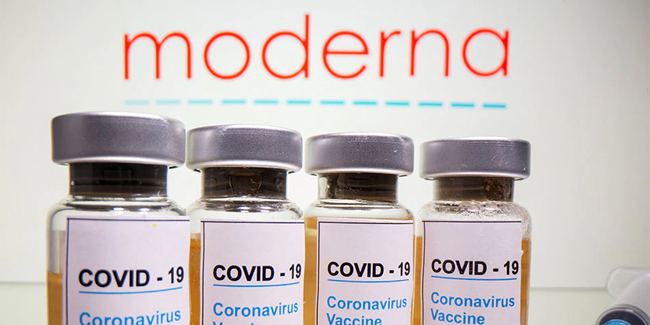Moderna had planned to start testing its COVID-19 vaccine in children.
Moderna on Wednesday announced that the company had planned to start testing its coronavirus vaccine in children ages 12 to 17.

In a report on ABS-CBN News, the said study — listed Wednesday on clinicaltrials.gov — was to include 3,000 children wherein half will be receiving two shots of COVID-19 vaccine four weeks apart, and the other half will be getting placebo shots of salt water.
However, the posting says the study is “not yet recruiting,” and Moderna spokesperson Colleen Hussey said that it wasn’t certain when the testing sites would be listed or start accepting volunteers.
As per the report, the link on the website to test centers wasn’t yet working and Hussey said that she wasn’t sure when it will become active.
READ ALSO: Moderna Applies For Emergency Use Authorization Of Its COVID-19 Vaccine
Moderna had applied to the Food and Drug Administration in the United States (US FDA) for emergency use authorization (EUA) in order to start vaccinating adults.
If approval was granted, certain groups of high-risk adults — including those in nursing homes — could receive vaccine doses late in December. However, no vaccine could be widely given to children until it had been tested in them.
Vaccines meant for both adults and children were generally tested first in adults in order to help ensure that they’re safe for pediatric trials.
Moderna’s vaccine had not yet been studied in children or pregnant women.
In the new clinical trial in adolescents, girls past puberty would be tested before each injection in order to make sure that they’re not pregnant.
READ ALSO: COVID-19 Vaccine May Be Available In PH By Q1 Of 2021, Says FDA Chief
Dr. William Schaffner, an adviser on vaccines to the Centers for Disease Control and Prevention and an infectious disease specialist at Vanderbilt University, said that everyone anticipated that when they tested the vaccine first in adolescents, then in older children, then the real small kids, that the COVID-19 vaccine would work.
However, Schaffner added, children had more active immune systems than adults and may have stronger reactions – including muscle and joint aches, more fever, and fatigue.
“You really want to be able to tell them clearly how you might feel for 24 or 48 hours after you receive the vaccine. And obviously, we really want to be able to tell parents it works,” Schaffner said.
Moreover, Schaffner said that if a child had intense side effects and parents weren’t prepared for it, they may be reluctant to go back for the second dose.
For more news and updates, you may feel free to visit this site more often. You may also visit Newspapers.ph via official Facebook page and YouTube channel.
